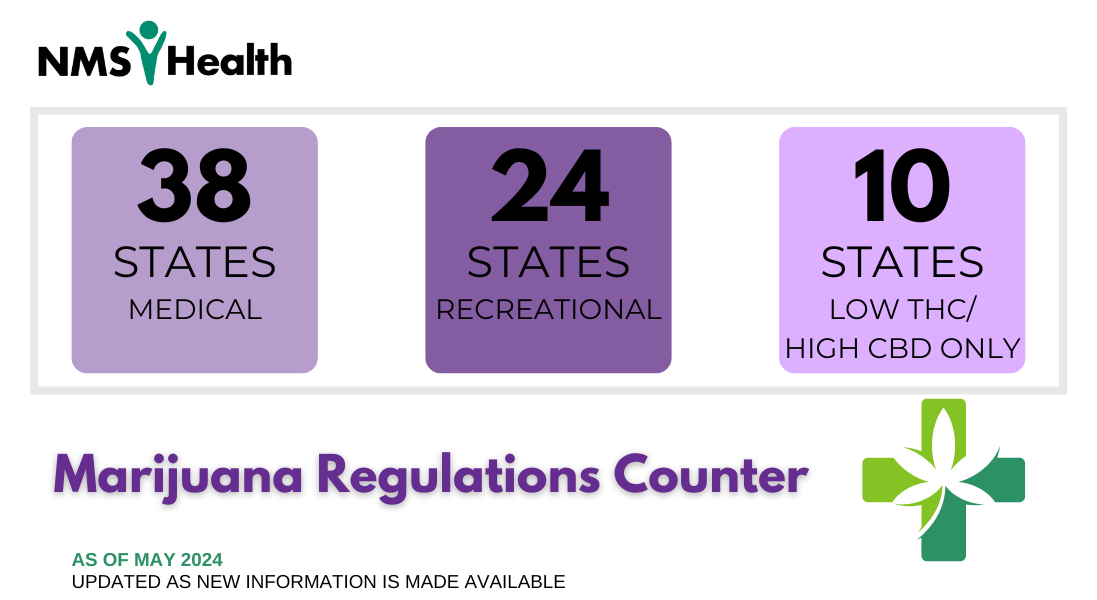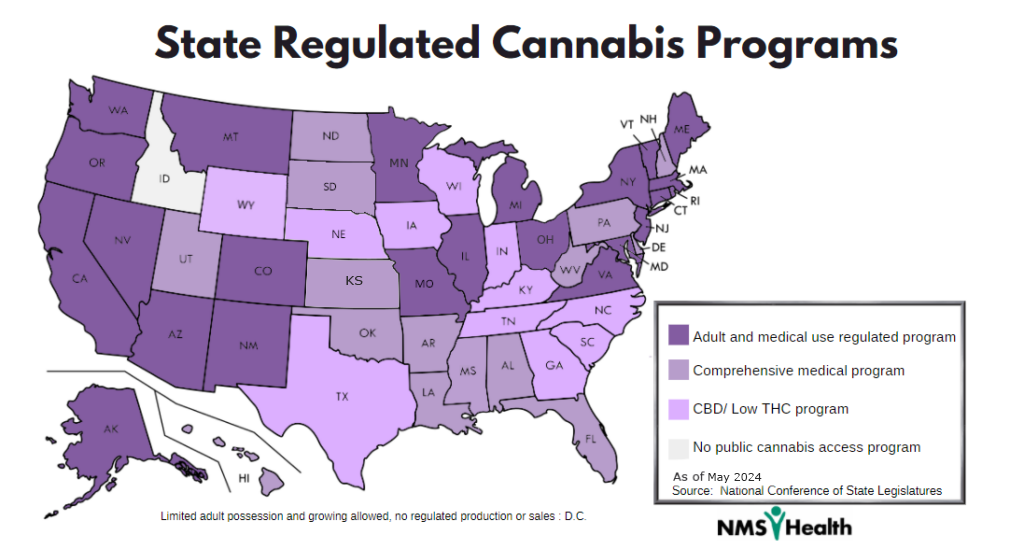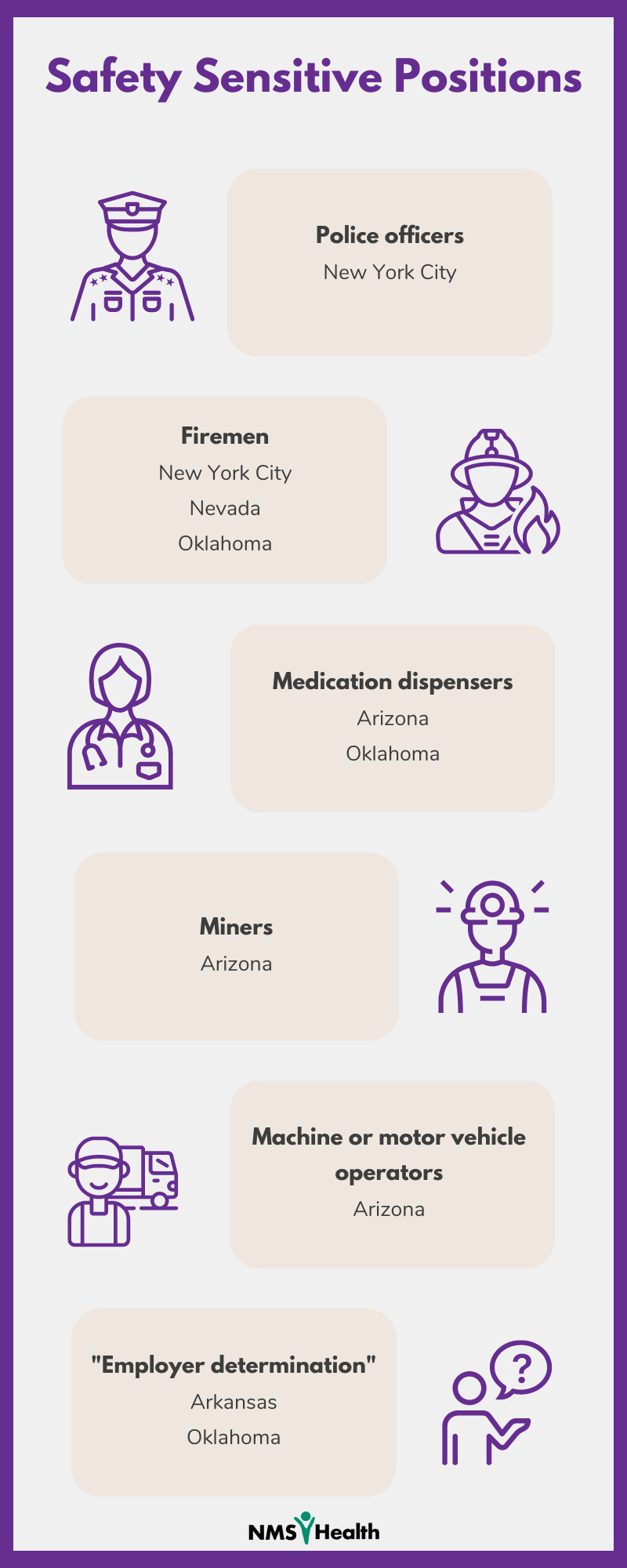
Information updated as of 05/1/2024
Medical and adult recreational marijuana use is becoming more and more socially accepted, and states are legalizing it at a frantic pace. However, at the federal level, marijuana is still listed as a Schedule I drug under the Controlled Substances Act, meaning that it is considered to have no currently accepted medical use and a high potential for abuse.
While marijuana is federally illegal in the United States, the Department of Justice has typically chosen not to go after those who possess and distribute marijuana in compliance with state laws. Due to this, marijuana regulations operate in two separate spaces. It is legal and illegal at the same time. This divide in regulations makes workplace drug testing an ever-changing and often confusing situation.
The landscape of handling positive drug tests has transformed from straightforward employee termination to a complex evaluation, as conflicting federal, state, and local laws create complexities in guidance on how to navigate marijuana use in the workplace. Explore our comprehensive marijuana testing guide for further insights.
Past and Current State of Marijuana Testing
Each year, the prevalence of marijuana use by the U.S. workforce continues to grow. In 2022, there was a notable 10.3% increase compared to 2021, reaching a record-high positivity rate of 4.3%, representing a significant 53.6% increase over the past five years from 2.8% in 2018.
Additionally, post-accident marijuana positivity of urine drug tests in the general U.S. workforce reached its highest level in 25 years, increasing to 7.3%, a rise of 9% compared to 2021. This peak follows a consistent increase in post-accident marijuana positivity every year since 2012, with a 204.2% increase over the past decade.
In states where recreational and medical marijuana use is legal, marijuana positivity rates in the general U.S. workforce increased by 11.8% and 8.3%, respectively, in 2022. In states where neither recreational nor medical marijuana is legal, marijuana positivity increased by 3.3% in 2022 and by 14.8% over five years.
The increase can be seen across industries. Over the five-year period, every industry category witnessed increased workforce positivity rates.
- Accommodation and Food Services: 42.9% increase
- Retail Trade: 42.6% increase
- Finance and Insurance: 38.5% increase
- Transportation and Warehousing: 35.9% increase
- Construction: 14.6%
- Manufacturing: 21.6% increase
When deciding on a drug testing policy for your employees, there are two primary considerations: what is required by law and what kind of employer we want to be?
What is Required by Law?
First and foremost, employers should be familiar with the laws in their state. All but three states have state-regulated cannabis programs in some capacity. Kansas (not pictured below) allows for THC-free only CBD. Residents, however, may use possession of low-THC products from another state for a medical reason as an "affirmable defense to prosecution." In November 2023, Ohio voted to make the Buckeye state the 24th and most recent state to legalize recreational marijuana. In March 2023, Kentucky Gov. Andy Beshear signed a bill legalizing medical use; however, it will not go into effect until 2025.
The momentum of the legalization movement continues, with four additional states—Florida, Idaho, Nebraska, and South Dakota—potentially joining the ranks of legalized states. Advocates in each state are rallying for referendums on their November general election ballots to legalize either recreational or medical marijuana use, depending on state laws.
Florida: Advocates are championing Amendment 3, aiming to legalize recreational marijuana for individuals aged 21 and older. A recent poll from the University of North Florida revealed that 67% of residents support this measure, signaling robust backing for legalization.
Idaho: Supporters are gathering signatures for the Idaho Medical Marijuana Initiative, which seeks to provide medical marijuana to individuals with chronic health conditions or terminal illnesses. A 2022 poll by the Idaho Statesman indicated that 68% of respondents favor decriminalizing cannabis for medical purposes.
Nebraska: Nebraskans for Medical Marijuana strives to qualify two medical cannabis initiatives for the November general election ballot. Recent polling shows that 70% of Nebraskans endorse legalizing medical marijuana, highlighting substantial support for the measures.
South Dakota: The South Dakota Marijuana Legalization Initiative, a citizen-led initiative, aims to legalize medical marijuana. While South Dakotans voted to legalize both medicinal and recreational marijuana in 2020, recreational legalization was later overturned. Should the measure appear on the ballot, it will likely garner significant support.
Comprehensive Medical
States with comprehensive medical marijuana laws allow the use of marijuana for individuals who have been examined by a medical provider. The medical provider must ensure that the individual has a condition in which marijuana is an effective treatment. Employees who are using marijuana medically must obtain a state-issued medical marijuana card, which needs to be renewed annually, and obtain cannabis from a regulated dispensary.
Adult Recreational
Generally speaking, if a state has recreational laws, it also has medical laws. In states where recreational use is permitted, individuals can obtain cannabis if they are of age to purchase it.
CBD
Seventeen states have laws regarding Cannabidiol (CBD) and Low THC products. CBD is an active compound found in the cannabis plant, which does not have the same psychoactive properties as THC but is derived from the marijuana plant.
By law, CBD products can contain up to 0.3% THC. While CBD is a chemical component of cannabis, 100% pure CBD will not be confused with THC or its metabolites on a drug screen. The production of CBD/Low THC products, however, is not federally monitored and based on some statistics, as many as 84% of CBD products are mislabeled. If the product has residual THC present, it will be metabolized and could present a positive result based on dosage and usage.
Things can be trickier for those with a national workforce. Meeting state-specific obligations becomes a challenge. Consistency in treatment is vital across your staff. Equitable treatment and accommodation must apply to every employee, regardless of location.
Employment Protections
State regulations must be carefully studied to determine if employment protections are made available under specific state laws. Employment protections vary state by state and differ depending on medical or recreational use.
Currently, 20 states have documented language in their regulations to provide employment protections for medical marijuana use, 15 states explicitly have no employee protections, and 7 states have regulations and case law that are silent regarding the need to accommodate. In the case of states with unclear protections, it becomes the employer's burden to weigh the risk of legal action versus the risk of employment.
Regarding recreational marijuana, at least nine states currently have explicit employment protections—California, Connecticut, Nevada, New Jersey, New York, Minnesota, Montana, Rhode Island, and Washington. Four states may provide employment protections for off-duty use only. Eleven states have made statements in the past that no protections exist for employees who use marijuana recreationally.
Recreational Marijuana Protections: State by State
California:
Effective January 1, 2024, California enacted a new marijuana law barring employers from discriminating against workers for lawful, off-duty cannabis consumption, be it medicinal or recreational. The legislation also forbids drug testing for non-psychoactive cannabis metabolites. However, on-the-job impairment remains a valid reason for discipline or termination. Exceptions include employees in the building and construction sector, situations where federal contracts, licenses, or funding necessitate compliance, and roles requiring federal background clearance.
Connecticut:
In Connecticut, employers are barred from rejecting applicants solely due to a positive marijuana test result. Furthermore, employers cannot take adverse action against employees for legal off-duty marijuana use unless, by not doing so, it would breach federal contracts or funding agreements. The protections do not apply to several types of employers and employees, including those with a primary activity of mining, construction, utilities, manufacturing, educational services, health care, social services, public order, safety, national security, and international affairs.
Illinois:
Illinois boasts the most comprehensive employment laws concerning recreational marijuana. The Right to Privacy in the Workplace Act prevents employers from refusing to hire, terminate, or discipline individuals for lawful off-duty product use, including marijuana.
The Illinois Cannabis Act provides further employer rights, allowing them to prohibit on-the-job intoxication, conduct reasonable drug testing, and discipline policy violators.
Employers must have a good-faith belief in employee impairment, showing specific, articulable symptoms that are affecting their performance, and those disciplined for marijuana-related impairment deserve a chance to contest the determination.
Michigan:
Michigan's rule now prohibits rescinding conditional offers of employment for most public employees in non-random drug testing positions solely due to marijuana positivity.
Minnesota:
In Minnesota, regulations have been implemented to limit drug testing for cannabis among workers. Random selection and pre-employment testing for cannabis are largely prohibited, except for safety-sensitive positions and situations outlined in collectively bargained agreements and contracts for professional athletes. Reasonable suspicion drug testing for cannabis is permitted, particularly following work-related accidents or injuries. However, these regulations do not apply if federal law mandates adverse action or testing.
Montana:
Montana offers nondiscrimination protection related to recreational marijuana. Employers cannot take adverse action against employees for off-duty use unless it impacts job performance or co-workers' safety. Exceptions apply to specific cases, such as professional service contracts or nonprofit employers whose primary purpose is to discourage public marijuana use.
Nevada:
Nevada presents a unique scenario where state law doesn't protect off-duty marijuana use due to its federal illegality. Employers, however, cannot reject applicants for positive marijuana tests, except in specific cases like safety-sensitive positions.
New Jersey:
New Jersey offers employment protections for off-duty marijuana use. Employers can't refuse to hire applicants due to positive tests or discharge employees unless impairment at work can be proven.
New York State:
Employers in New York State can't discriminate against applicants or employees for legal, off-duty marijuana use. Employees cannot be fired for recreational marijuana use outside of work. Adverse action is permissible if required by state or federal law, if impairment occurs on the job, or if not taking action would result in losing federal contracts or funding.
Rhode Island:
Rhode Island, like its neighbor Connecticut, cannot refuse to employ an applicant based solely on a positive test result for marijuana. Their law prohibits discrimination against off-duty marijuana use. Exceptions exist for use being prohibited due to collective bargaining agreements, employees who work hazardous jobs or those essential to public welfare and safety, and if failing to do so, would result in loss of federal contracts and funding.
Virginia:
Virginia's law prohibits requiring disclosure of arrest, criminal charges, or conviction of simple marijuana possession information during hiring. This includes any application for hire.
Washington:
Starting January 1, 2024, Washington's new law prevents discrimination based on lawful, off-duty recreational marijuana use. Refusing to hire based on positive non-psychoactive cannabis metabolite tests is not allowed, with exceptions for federal contracts, funding, licensing, and safety-sensitive positions.
Washington, D.C.:
Employers in Washington, D.C., can't refuse to hire or take adverse action against employees for recreational or medical marijuana use or failing a marijuana drug test.
Understandably, no employment protections are available for those in safety-designated positions in any state.
Safety Sensitive Positions
Safety sensitive and safety-designated positions are not synonymous. Safety-designated positions are positions such as those within the Department of Transportation that are held to a federal standard. DOT drivers must participate in drug screening, including screening for THC. The DOT does not accept medical marijuana exemptions.
Safety sensitive is not an industry term, it is a defined term. Employers should not assume what safety sensitivity means in regard to state regulations. Only a few jurisdictions have defined the term safety sensitive, so it is best practice to review any rules in the states where you operate.
Some examples of safety sensitive positions are:
Testing
In the current economic environment, many employers outside of safety-sensitive industries are taking marijuana out of their drug-screening protocols. By refusing to hire those who test positive it could create potential staffing problems, particularly in areas where cannabis has been decriminalized.
Previously, Amazon, the second largest private employer in the country, announced that it would no longer be testing employees for marijuana for those in positions that the U.S. Department of Transportation does not regulate. The company said it would treat marijuana use the same as alcohol use.
According to Quest Diagnostics, employers’ general workforce testing between 2015-2020 showed a decrease in THC inclusion panel ordering for non-recreational/medical by 3.4%. THC inclusion panels in medical marijuana-regulated states declined 4.2%, and THC inclusion panels for recreational states fell by 8.5%. Data also shows that from March to December 2021, the percentage of tests conducted where THC was removed from the panel almost doubled! In March 2021, 6.31% of the testing volume was tested without THC; in December 2021, it was 11.01%. With large-standing companies committing to reforming their drug testing policies, this may be a sign of future trends.
As part of the pre-employment process, drug screening can currently continue without testing for marijuana. Some common urine test panels are:
- 4-Panel - No THC: Amphetamines, Cocaine, Opioids, Phencyclidine
- 7-Panel - No THC: Amphetamines, Barbiturates Standard, Benzodiazepines, Cocaine, Opiates, Oxycodone/Oxymorphone, Phencyclidine
- 10-Panel - No THC: Amphetamines, Barbiturates, Benzodiazepine, Cocaine, Methaqualone, Opiates, 6-Acetylmorphine, Phencyclidine, Methadone, Propoxyphene
The Marijuana Testing Guide to Impairment
There is not a legal or scientifically agreed-upon definition for impairment, and as such, there is no standard workplace drug test to provide insight as to whether or not an employee is impaired. However, “under the influence” is a policy term that can be included within your own company’s handbook. Your handbook can use signs and symptoms of marijuana use, certain behaviors, as well as positive drug test results as “proof of being under the influence” as long as it abides by the state regulations in which you operate.
You can also decide not to test for marijuana metabolites during drug screenings. If you do forgo testing for marijuana and accommodate employee’s use of cannabis outside of work, it should be made clear that impairment at work will not be tolerated. Much like alcohol use, employees are expected to come to work sober.
Companies can test for alcohol after an incident, but that does not work as well with marijuana usage. There is no standard limit recognized as the intoxication limit for THC. It can take a minimum of a few hours for metabolites to become present in the employee’s system. Additionally, marijuana’s longevity in the employee system is variable - it depends on their metabolization, if they are a frequent or infrequent user, etc.
The Marijuana Testing Guide to Post-Accident Statistics
According to Quest’s general workforce data, post-accident positivity rates jumped 166.7% between 2012 and 2020. While correlation does not necessarily mean causation, the data is quite concerning. Testing employees post-accident is legal in all states, but the laws of each state must be met. If you have employees in multiple states, you must comply with all of them.
"Intoxicating cannabis products, including marijuana, can have a major impact on safety at work and have been proven to slow reaction time, impact memory, and impair skills essential to driving. State legalization of the drug creates new challenges for employers," said Katie Mueller, a senior program manager at the National Safety Council focusing on cannabis safety. "The Quest data provide compelling evidence that increased use of cannabis products by employees can contribute to greater risk for injuries in the workplace. It is imperative employers take the proper steps to create and maintain a policy that addresses cannabis use, build a safety-focused culture, and educate the workforce to keep all workers safe on and off the job."
According to the National Safety Council, the industries with the most significant number of workplace injuries are:
- Service (including police and firefighters)
- Transportation/Shipping
- Manufacturing/Production
- Installation, maintenance, and repair
- Construction
Typically, after an accident, an employee will be sent for a post-accident screening. If you have DOT employees, it must follow the federally mandated guidelines. For example, the employee who tested positive in their post-accident test must be removed from any safety sensitive duties. Depending on the circumstances, they will then be evaluated by a substance abuse professional. If they’re not terminated, they will undergo a treatment program. Once the substance abuse program has been completed, they can then undergo a return to duty drug screen. A similar policy can also be implemented for those general workforce employees, as long as it aligns with the regulations of the states you operate in.
It is also essential to create an environment where employees are not afraid of workplace retaliation and will come forward to report accidents. Your policy needs to reflect that if an employee is involved in a post-accident drug screen, it is available to them beyond punishment or termination based on the findings of the accident and that they may have the opportunity to discuss what led to the accident.
What Kind of Employer Do You Want To Be?
Different industries may answer this question differently. Those who run a manufacturing company may approach the situation much differently than a company whose employees work in cubicles all day. Additionally, some sectors have employees who must abide by federal regulations that mandate marijuana testing. Workers such as those in the Department of Transportation must be screened for drug and alcohol use. Even if a DOT or Federal Worker is eligible for medical marijuana in their state, it is NOT considered a medical exemption for their position.
What Does NMS Recommend?
- Create a comprehensive drug policy that is enforced unilaterally across your company.
- Create policies with local law and industry in mind.
- Be clear and transparent about these policies with all applicants and employees.
- Be clear and transparent about the consequences of testing positive.
- Start thinking of marijuana in the workplace as you think of alcohol.
- Focus on prohibiting use, possession, and impairment in the workplace.
- Focus on safety and testing when there’s a reasonable suspicion of workplace impairment.
Ready to take proactive steps for a safer and more compliant workplace? NMS Health is your ally in creating a customized, all-encompassing drug testing policy that aligns with your industry and local mandates. Get started today and discover how we can simplify your approach!
Source Material
[3] https://www.nationaldrugscreening.com/blogs/marijuana-and-employer-concerns-update-may-1-2021/
[4] https://www.longislandpress.com/2021/05/11/what-pot-legalization-will-mean-for-the-workplace/
[7] Quest Diagnostics Webinar





